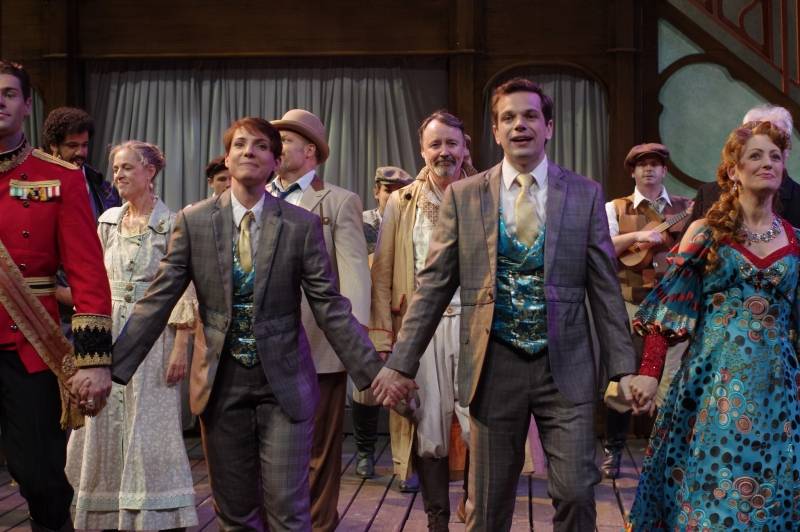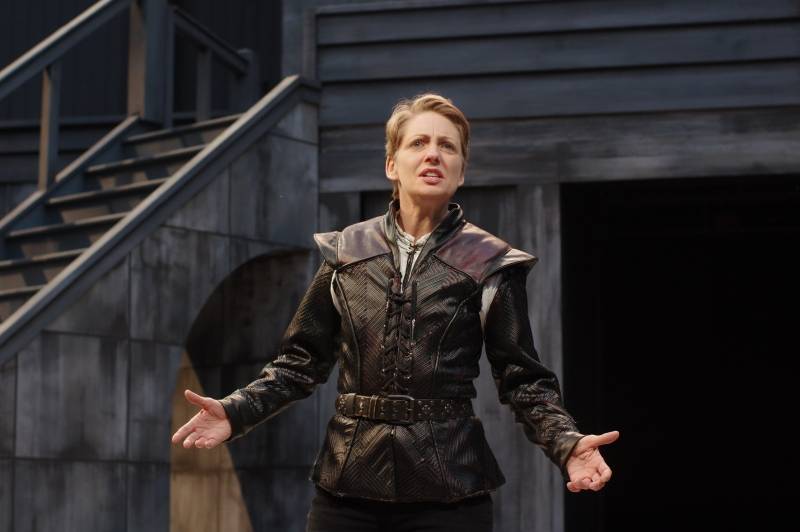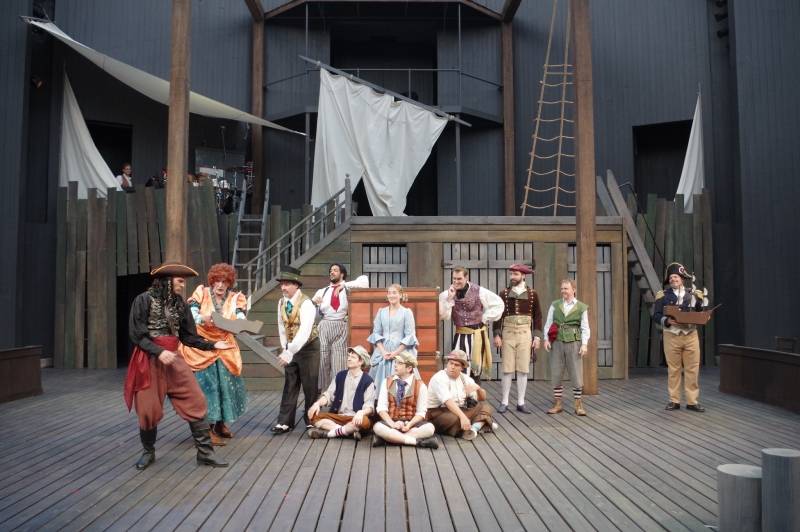A central-Illinois highlight of summer, the Illinois Shakespeare Festival soft-opened its 39th season last week in Bloomington-Normal. Held outdoors at the Ewing Manor, just a short drive west on 74, this showcase of traditional and creative productions of Shakespearean plays is one of the few reasons I’d suggest you leave town. ISF offers consistently high-quality stagings by local, regional, and national-level casts and crews, but without the big-city price tag. It’s a great opportunity to experience a cultural event for about the same price it would cost to park in Chicago. On top of that, with picnic-ing encouraged, gorgeous weather, and events for families, it’s a fun evening out for anyone.
 This year’s season features three main-stage plays, with other rotating events featured. 2016’s roster contains a traditional Hamlet, a gussied-up Twelfth Night, and the third play (usually non-Shakespearean) will be the musical Peter and the Starcatchers, the adaptation of the books by Dave Barry and Ridley Pearson that has been running on Broadway. Kevin Rich, the Artistic Director of the festival, obligingly answered my many questions about the lineup in particular and the festival in general.
This year’s season features three main-stage plays, with other rotating events featured. 2016’s roster contains a traditional Hamlet, a gussied-up Twelfth Night, and the third play (usually non-Shakespearean) will be the musical Peter and the Starcatchers, the adaptation of the books by Dave Barry and Ridley Pearson that has been running on Broadway. Kevin Rich, the Artistic Director of the festival, obligingly answered my many questions about the lineup in particular and the festival in general.
SP: Twelfth Night seems to be a recent festival favorite, being staged every 5-6 years since 2001, according to your website…
Kevin Rich: We did perform a one-hour abridgment of Twelfth Night as our free Theatre for Young Audiences production in 2011, but the last time we’ve produced it on our main stage was 2005. In our 39 year history, we’ve never produced a play more than five times, but 9 plays stand at 5 apiece: Comedy of Errors, Taming of the Shrew, A Midsummer Night’s Dream, Much Ado About Nothing, As You Like It, Romeo and Juliet, Macbeth, and this year’s productions of Hamlet and Twelfth Night.
SP: Would you say this is more a crowd-pleaser, or is it a personal favorite?
Rich: Both! Shakespeare’s comedies are historically very popular with ISF audiences, so we always produce one of them each year. Twelfth Night has been the most often-requested in recent years, probably because we haven’t cycled back to it in over a decade.
SP: What do you think is the particular draw of this comedy?
I think it is one of his richest and most complex comedies. It still has lots of the fun stuff featured in his early comedies —music, gender bending, mistaken identities, pranks and shenanigans— but as one of the late comedies, there’s also a darkness to it, a melancholy, a bit of an edge. There’s love won, but there’s also love lost, and love imagined. And there’s hypocrisy exposed: I think this production does a particularly good job of placing the Puritan, black-and-white thinking Malvolio and the world-weary, shades-of-gray Feste on opposite ends of a spectrum, with other characters, such as Olivia (who sees the good in both of them) somewhere in the middle.
SP: I read that this production will be set in “early 20th century” which covers a lot of ground. The show poster makes me think jazz-era, but do you care to speak more to the specifics?
Rich: We based our design world on Art Nouveau: Alphonse Mucha, Gustav Klimnt, Audrey Beardsley; circa 1900-1914.

SP: Hamlet with a female-lead has been high on my list of “to-see”s for a while now. The staging is reportedly “vaguely Elizabethan” but the gender-swap would really affect the plot if the character was a woman in Elizabethan times… so will Ms. Staples be playing a male character?
Rich: In the way that Shakespeare’s company played fast and loose with the rules concerning time period (Hamlet is set in 10th century Denmark and yet they wore Elizabethan clothes, etc), this production seeks a fusion between old and new, classical and contemporary, so that it will hopefully feel, as I believe Shakespeare wanted all of his productions to feel, of a different time and also of our own.
And yes, Ms. Staples is playing Hamlet as a male character. Gender-bending is in the DNA of Shakespeare’s plays; I know for sure that we have done at least some cross-gender casting in every season since I arrived in 2013, and I’m pretty sure it predates me as well. I really believe that Shakespeare was deeply exploring gender (among a million other things) in his plays; he was a playwright of comparison, and masculine vs. feminine was certainly one of those comparisons. Hamlet is an artist, wrestling with a complicated mix of rage, compassion and sensitivity; Deb Staples, one of the best classical actors in the country, has tremendous access to both masculine and feminine energy, and is consequently perfect for this role.
SP: Director Leda Hoffmann and actress Deborah Staples both hail from Milwaukee and have credits at the Milwaukee Repertory Theatre… should we assume they know each other? Maybe even worked together before?
Rich: They have! Leda recently directed The Amish Project at the Milwaukee Rep, with Deb starring in the one-woman show.
SP: Did they develop this adaptation together, or is it primarily Ms. Hoffmann’s vision?
Rich: I originally had the idea of Deb playing Hamlet for us in 2014 when she was here knocking it out of the park as Cleopatra and Queen Elizabeth. She wore a wig in both productions, and consequently got her hair cut short; she walked into rehearsal the next day with a page-boy haircut and wearing cargo pants, and I thought, wow – she looks like Hamlet. At the end of the summer in our exit interview, I asked what roles she had yet to play; she mentioned the few remaining female roles in the canon she hadn’t played (including Olivia in Twelfth Night, which she is also playing this summer), and then she said, “and my husband has always said I should play Hamlet.” I said, “Funny you should say that,” and she just about fell out of her chair.
Two years later, I called Leda with the offer to direct Deb in Hamlet, and she took the idea and ran with it. Her immediate response was to celebrate having such a gifted actor in the title role of this play, and, in her words, “just do the play. It’s a remarkable play. Let’s just tell the story.” We have surrounded Deb with an all star cast of terrific actors and an incredible design team and are very excited to share this with an audience.

SP: Peter and the Starcatchers … I know traditionally the Illinios Shakespeare Festival stages one non-Shakespearean play, but in my experience, there is still some relation to the Bard evident. So what prompted this particular choice to round out this year’s schedule?
Rich: For the first 25 years of the Festival’s history, we did 3 Shakespeares each summer, but consequently started to cycle through the canon pretty quickly. To slow that down, ISF began programming a non-Shakespeare in the third slot, which has varied from a contemporary of Shakespeare’s to a family-friendly farce to new work with some sort of tie to Shakespeare. In recent years, we’ve been producing contemporary plays in that slot that either references Shakespeare, such as 2011’s Complete Works (Abridged), 2014’s Elizabeth Rex, and 2015’s Q Gents, or that has the characteristics of a Shakespearean play, such as 2013’s Failure: A Love Story and this season’s Peter and the Starcatcher.
I’ve been trying to get the rights to this play for years. It’s got everything we want for a play in this slot: it’s goofy, smart, imaginative, and fun for the whole family. Many patrons who have come to the Festival since its inception have told me, “I came when I was a kid, and now I’m bringing my kids.” I love hearing this, and we want to keep hearing it. In fact, we’ve re-introduced the “Silver Section” this year to create a more affordable entry-level ticket price to make this production (and the whole season) more accessible to families throughout our community.
SP: For an audience expecting a Shakespearean experience, what does this play offer?
Rich: We’re just as interested in Shakespeare’s practices as we are in his plays. As a Shakespeare Festival, I think it is our responsibility to celebrate both, and ask the question, how did Shakespeare design his plays to be performed? Shakespeare wrote new plays inspired by his classics for a popular audience, featuring poetic language, live music, gender-bending, direct address, and imaginative theatricality. We want to nurture our own playwrights who are doing the same thing. Peter and the Starcatcher is a terrific example: it is inspired by the classical tale Peter Pan and is a story told with a very similar theatrical vocabulary to Shakespeare’s. In fact, here’s an article about the creation of this play that ties it to the Royal Shakespeare Company’s 1980 production of The Life and Adventures of Nicholas Nickleby. The connections between these two productions, and also to Shakespeare’s theatre, are really cool.
It all depends on how you define it, but I see Peter and the Starcatcher as a Shakespearean play. Same goes for all the contemporary work we’ve produced in recent years. New work is always a risk, because audiences aren’t as familiar with the titles, but I really do feel a responsibility to give our poet/playwrights an opportunity to develop their work. The Shakespeare who wrote Taming of the Shrew was not the same Shakespeare who wrote The Tempest. Over 38 plays, he evolved, his plays evolved, and, I believe, his audience evolved. I’m excited to say that our audience for the non-Shakespeare show has been steadily growing in recent years, and I’ve heard from many patrons, “I’d never heard of this one before, but I’ve come to trust that the third show will be one worth watching!”

SP: From your “Past seasons” page, it seems like ISF has varied recently between offering 3 or 4 plays, and this year you’re at 3. Do I get to blame Springfield for this, or are there other reasons for the reduction in production?
Rich: From the beginning, ISF has offered three shows in rotating repertory on our main stage. In 2008, we added a fourth show: the Theatre for Young Audiences production that we offer for no charge on Wednesday and Saturday mornings at 10am during the run of the Festival. That hasn’t gone away; this year’s fourth show is RODEO, by Philip Dawkins: a spaghetti western adaptation of As You Like It, about a girl and her mule who want to compete in the Rodeo by are shut out by a silly no-girls-allowed rule. So she dresses as a boy and the mule dresses as a horse and they compete!
Despite the challenges from Springfield, we’ve actually been growing our programming in recent years. In 2013 we added a fifth production, bringing in the brilliant and hilarious Improvised Shakespeare Company from Chicago, who will perform at 5:30 on Sunday nights this summer. We’ve started having a year-round presence as well: our ISF Touring Company has performed Shakespearean abridgments to over 5,000 students since 2013; and in 2014 we started a new Halloween tradition, ShakesFEAR, featuring the ghost of William Shakespeare and scary characters from his plays.
SP: Over the course of four decades, any event would change. In the early oughts, I remember it seeming like a very serious, scholarly endeavor. It seems like the scope and intent of the fest may be changing somewhat… could you speak to what is changing, and the reasons behind it?
Rich: 2009 was my first summer here as an actor, and this is my fourth season as artistic director, so my history with the Festival isn’t even 10 years old. Having said that, I did meet with the late Cal Pritner (who founded ISF) during my first year as AD and found we had many things in common, including our desire that ISF be, as Shakespeare’s theatre was, a meeting place for our entire community. So while the scope of the Festival may have changed with additional programming, it’s my hope that the intent hasn’t.
The more I learn about this playwright and his plays, the more I appreciate his ability to reach across boundaries and appeal to his entire community, rather than a specific cross section. In his day, the nobility loved him for his knowledge of England and the depth of his understanding about the trials and tribulations of the political sphere; scholars and colleagues loved him for his poetic and theatrical genius and his remarkable facility with text and rhetoric; and the groundlings loved him for his bawdy humor, his brilliant clowns, his battle scenes, and the depth of his understanding about the trials and tribulations of love. Just as Shakespeare wrote a huge variety of plays, we too try to offer something for everyone; a comedy, a tragedy or history, a contemporary play and a kids’ show; some in period dress and some with a modern feel; and we supplement these productions with everything from food trucks and beer tastings to live jazz and interdisciplinary panel discussions about the plays.
SP: Is there anything else you’d like our readers to know?
Rich: Insider tips! We tend to sell out toward the end of the season, so I’d recommend coming early, and/or visiting us on “off-peak” days. We have post-show talk backs and a free ice cream social following every Wednesday night performance, and on Sundays, the Improvised Shakespeare Company performs a one hour show at 5:30, prior to the MainStage performance at 7:30. Patrons enjoy the Sunday double-header, and either picnic in-between or grab dinner from the food truck onsite*.
(*In past years, this food truck has been The Bustaurant, which has made appearances here in C-U, and has been delicious every time. — ed.)
—
The Illinois Shakespeare Festival stages performances from now through mid-August, rotating plays on different days of the week and weekend. The homepage lists the current week’s productions, and each play’s page lists all its show dates. Tickets range in price from $10-$47, and the pricing structure is easier to see than to explain, so I would also recommend looking at their ticket page to determine what works best for you. Tickets are sold through Ticketmaster —so you could cash in those settlement vouchers— but are also available at the door or by calling (309) 438-2535 between noon and 4 p.m. on weekdays.
About the author…
As Arts Editor for Smile Politely, rk’s eyes may be bigger than her schedule when it comes to doing things around town. Still, that’s why she hasminionswriters. Look for her wherever books can be found, or follow her nearly-fallow Twitter handle @rknaur.









 About the author…
About the author…